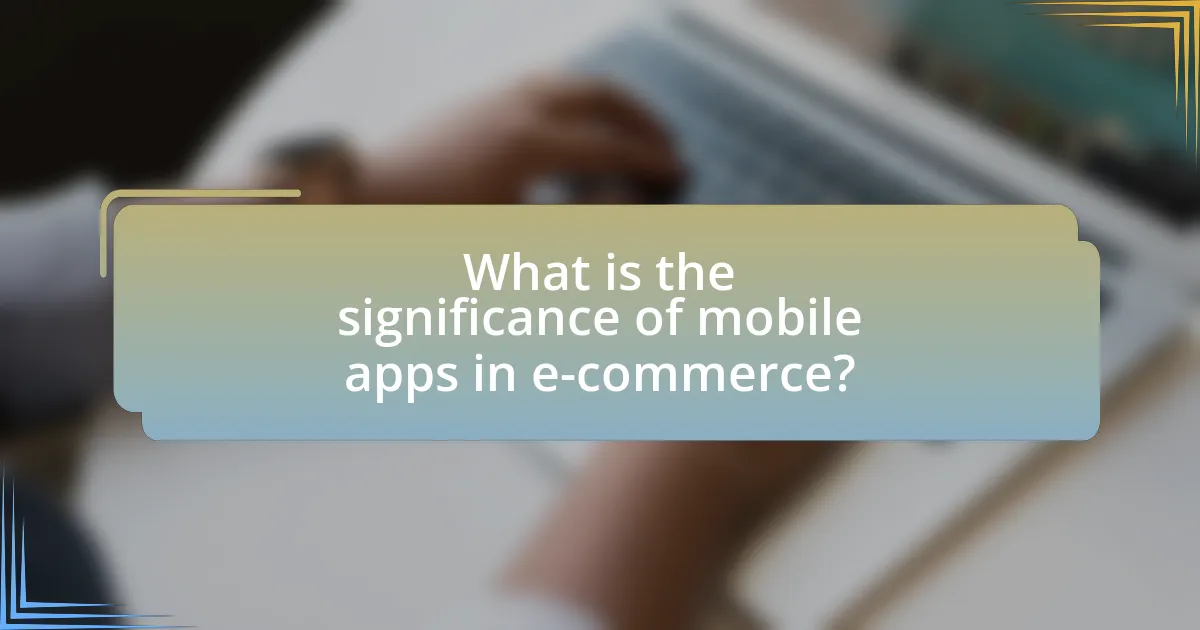The article analyzes the growth of mobile apps in e-commerce, highlighting their significance in enhancing user experience, increasing customer engagement, and driving sales. It discusses how mobile apps have transformed the e-commerce landscape by facilitating seamless shopping experiences and personalized marketing strategies. Key features of successful mobile e-commerce apps, such as user-friendly interfaces and secure payment options, are examined, along with the impact of consumer behavior and technological advancements on app adoption. The article also addresses the challenges businesses face in app development and offers strategies for maximizing app growth and user engagement.

What is the significance of mobile apps in e-commerce?
Mobile apps are significant in e-commerce as they enhance user experience, increase customer engagement, and drive sales. The convenience of mobile apps allows consumers to shop anytime and anywhere, leading to higher conversion rates; for instance, studies show that mobile apps can increase conversion rates by up to 3 times compared to mobile websites. Additionally, mobile apps facilitate personalized marketing through push notifications and tailored content, which can boost customer retention and loyalty. According to a report by Statista, mobile commerce accounted for 72.9% of total e-commerce sales in 2021, underscoring the critical role of mobile apps in the e-commerce landscape.
How have mobile apps transformed the e-commerce landscape?
Mobile apps have transformed the e-commerce landscape by enabling seamless shopping experiences and enhancing customer engagement. The rise of mobile commerce, driven by apps, has led to a significant increase in online sales; for instance, mobile commerce accounted for 72.9% of total e-commerce sales in 2021, according to Statista. This transformation is characterized by features such as personalized shopping experiences, push notifications for promotions, and simplified payment processes, which collectively improve user convenience and satisfaction. Additionally, mobile apps facilitate access to a global market, allowing businesses to reach customers anytime and anywhere, further driving sales growth and brand loyalty.
What are the key features of successful mobile e-commerce apps?
Successful mobile e-commerce apps possess several key features that enhance user experience and drive sales. These features include a user-friendly interface, which simplifies navigation and product discovery; secure payment options, ensuring customer trust and safety; personalized recommendations, leveraging data analytics to increase engagement; and efficient search functionality, allowing users to find products quickly. Additionally, successful apps often incorporate push notifications to keep users informed about promotions and updates, as well as seamless integration with social media platforms for easy sharing and marketing. According to a study by Statista, mobile e-commerce sales are projected to reach $3.56 trillion by 2021, highlighting the importance of these features in driving consumer behavior and app success.
How do mobile apps enhance customer experience in e-commerce?
Mobile apps enhance customer experience in e-commerce by providing personalized shopping experiences, streamlined navigation, and faster transaction processes. These applications utilize data analytics to tailor product recommendations based on user behavior, which increases engagement and satisfaction. For instance, a study by Statista indicates that 54% of consumers prefer mobile apps for shopping due to their ease of use and personalized features. Additionally, mobile apps often include features like one-click purchasing and push notifications, which facilitate quicker transactions and keep customers informed about promotions, further enhancing their shopping experience.
Why is the growth of mobile apps important for e-commerce businesses?
The growth of mobile apps is crucial for e-commerce businesses because it enhances customer engagement and increases sales opportunities. Mobile apps provide a convenient shopping experience, allowing users to browse and purchase products anytime and anywhere. According to a report by Statista, mobile commerce accounted for 72.9% of total e-commerce sales in 2021, highlighting the significant shift towards mobile platforms. This trend indicates that businesses with mobile apps can capture a larger market share and improve customer retention through personalized experiences and targeted marketing strategies.
What statistics highlight the growth of mobile app usage in e-commerce?
Mobile app usage in e-commerce has seen significant growth, with statistics indicating that mobile apps account for 72.9% of total e-commerce sales in 2021, up from 57.5% in 2020. Additionally, a report by Statista shows that mobile e-commerce sales are projected to reach $3.56 trillion by 2024, representing a compound annual growth rate of 18.3%. Furthermore, according to a survey by eMarketer, 79% of smartphone users made a purchase via a mobile app in 2021, highlighting the increasing reliance on mobile platforms for shopping. These statistics underscore the rapid expansion of mobile app usage within the e-commerce sector.
How do mobile apps impact sales and revenue in e-commerce?
Mobile apps significantly enhance sales and revenue in e-commerce by providing a streamlined shopping experience and increasing customer engagement. Research indicates that mobile apps can boost conversion rates by up to 150% compared to mobile websites, as they offer personalized experiences, faster load times, and easier navigation. Additionally, a study by Statista shows that mobile commerce accounted for over 54% of total e-commerce sales in 2021, highlighting the critical role of mobile apps in driving revenue growth.

What factors contribute to the growth of mobile apps in e-commerce?
The growth of mobile apps in e-commerce is primarily driven by increased smartphone penetration and consumer preference for mobile shopping. As of 2023, over 6.8 billion smartphone users globally facilitate easy access to e-commerce platforms, leading to a surge in mobile app downloads. Additionally, the convenience of mobile apps, which offer features like personalized shopping experiences, push notifications, and seamless payment options, enhances user engagement and retention. According to a report by Statista, mobile commerce accounted for 73% of total e-commerce sales in 2021, highlighting the significant shift towards mobile platforms. Furthermore, advancements in mobile technology, such as improved internet connectivity and app functionalities, continue to support the expansion of mobile apps in the e-commerce sector.
How does consumer behavior influence mobile app adoption in e-commerce?
Consumer behavior significantly influences mobile app adoption in e-commerce by shaping preferences for convenience, personalization, and user experience. Research indicates that 79% of consumers prefer mobile apps for shopping due to their ease of use and faster checkout processes. Additionally, consumer expectations for personalized experiences drive app developers to integrate features like tailored recommendations and loyalty rewards, which enhance user engagement. This trend is supported by a study from Statista, which found that mobile app usage in e-commerce increased by 54% from 2019 to 2021, reflecting a direct correlation between consumer behavior and app adoption rates.
What trends are driving consumers to prefer mobile apps over websites?
Consumers increasingly prefer mobile apps over websites due to trends such as enhanced user experience, personalization, and convenience. Mobile apps provide faster loading times and smoother navigation, which significantly improve user satisfaction. Additionally, apps leverage data analytics to offer personalized content and recommendations, making the shopping experience more relevant to individual users. The convenience of accessing apps anytime and anywhere, along with features like push notifications for promotions and updates, further drives consumer preference. According to a report by Statista, mobile apps account for 88% of the time spent on mobile devices, highlighting their dominance over mobile web browsing.
How do demographics affect mobile app usage in e-commerce?
Demographics significantly influence mobile app usage in e-commerce by determining user preferences, behaviors, and engagement levels. For instance, younger consumers, particularly those aged 18-34, are more likely to use mobile apps for shopping due to their familiarity with technology and preference for convenience, as evidenced by a 2021 Statista report indicating that 54% of this age group prefers mobile shopping over desktop. In contrast, older demographics, such as those aged 55 and above, may exhibit lower app usage rates, often favoring traditional shopping methods or desktop browsing, which can be attributed to less comfort with mobile technology. Additionally, income levels affect app usage; higher-income individuals tend to engage more with premium e-commerce apps that offer exclusive deals and features, while lower-income users may prioritize budget-friendly options. This demographic variation underscores the necessity for e-commerce businesses to tailor their mobile app experiences to meet the distinct needs of different age groups and income brackets, thereby enhancing user engagement and satisfaction.
What role does technology play in the growth of mobile apps for e-commerce?
Technology is a critical driver in the growth of mobile apps for e-commerce by enhancing user experience, streamlining operations, and enabling data-driven decision-making. The integration of advanced technologies such as artificial intelligence, machine learning, and augmented reality allows e-commerce apps to offer personalized shopping experiences, optimize inventory management, and improve customer engagement. For instance, a report by Statista indicates that mobile e-commerce sales are projected to reach $3.56 trillion by 2021, highlighting the significant impact of technology on consumer behavior and purchasing patterns. Furthermore, the adoption of secure payment gateways and mobile wallets has increased consumer trust and convenience, further accelerating the growth of mobile e-commerce applications.
How do advancements in mobile technology enhance app functionality?
Advancements in mobile technology enhance app functionality by enabling faster processing speeds, improved connectivity, and advanced features such as augmented reality and machine learning. These enhancements allow apps to perform complex tasks more efficiently, provide real-time data access, and offer personalized user experiences. For instance, the introduction of 5G technology significantly increases data transfer rates, allowing apps to load content quickly and support high-quality streaming. Additionally, the integration of AI capabilities enables apps to analyze user behavior and preferences, leading to tailored recommendations and improved customer engagement. These technological improvements directly contribute to the overall effectiveness and usability of mobile applications in e-commerce, driving user satisfaction and increasing sales.
What are the security considerations for mobile e-commerce apps?
Security considerations for mobile e-commerce apps include data encryption, secure authentication, and protection against malware. Data encryption ensures that sensitive information, such as payment details and personal data, is transmitted securely, reducing the risk of interception. Secure authentication methods, such as two-factor authentication, help verify user identities and prevent unauthorized access. Additionally, mobile e-commerce apps must implement measures to protect against malware and phishing attacks, which can compromise user data and trust. According to a report by the Ponemon Institute, 60% of organizations experienced a data breach due to insecure mobile applications, highlighting the critical need for robust security measures in this sector.

What challenges do businesses face in developing mobile apps for e-commerce?
Businesses face several challenges in developing mobile apps for e-commerce, including high development costs, platform fragmentation, and user experience optimization. High development costs can arise from the need for skilled developers and ongoing maintenance, with estimates suggesting that the average cost of developing a mobile app ranges from $50,000 to $250,000. Platform fragmentation presents a challenge as businesses must ensure compatibility across various operating systems, such as iOS and Android, which can complicate the development process. Additionally, optimizing user experience is critical; research indicates that 88% of users are less likely to return to a site after a bad experience, emphasizing the need for intuitive design and seamless functionality. These challenges collectively impact the successful deployment and adoption of e-commerce mobile apps.
How can businesses overcome common obstacles in mobile app development?
Businesses can overcome common obstacles in mobile app development by implementing a structured approach that includes thorough planning, user-centered design, and agile methodologies. Effective planning involves defining clear objectives, target audience, and budget constraints, which helps in aligning development efforts with business goals. User-centered design focuses on creating intuitive interfaces and seamless user experiences, which can be validated through user testing and feedback. Agile methodologies allow for iterative development, enabling businesses to adapt to changes quickly and incorporate user feedback throughout the development process. According to a report by Statista, 21% of mobile app developers cite lack of user engagement as a major challenge, highlighting the importance of these strategies in addressing obstacles effectively.
What are the costs associated with developing a mobile e-commerce app?
The costs associated with developing a mobile e-commerce app typically range from $30,000 to $500,000, depending on various factors such as complexity, features, and platform. For instance, a basic app with essential features may cost around $30,000, while a more complex app with advanced functionalities like payment integration, user authentication, and real-time tracking can escalate costs significantly. According to a report by Clutch, the average cost for mobile app development is approximately $150,000, which reflects the investment required for quality design, development, and testing. Additionally, ongoing maintenance and updates can add 15-20% of the initial development cost annually, further influencing the total expenditure.
How can businesses ensure their app stands out in a crowded market?
Businesses can ensure their app stands out in a crowded market by focusing on unique value propositions and exceptional user experience. By identifying and emphasizing features that differentiate their app from competitors, such as innovative functionalities or niche targeting, businesses can attract specific user segments. Additionally, investing in user-friendly design and seamless navigation enhances user satisfaction, leading to higher retention rates. Research indicates that 79% of users who have a bad experience with an app are unlikely to use it again, highlighting the importance of a positive user experience in maintaining a competitive edge.
What strategies can businesses implement to maximize mobile app growth?
To maximize mobile app growth, businesses should implement targeted user acquisition strategies, optimize app store visibility, and enhance user engagement through personalized experiences. Targeted user acquisition involves utilizing data analytics to identify and reach potential users through social media advertising and influencer partnerships, which can increase downloads significantly. Optimizing app store visibility, or App Store Optimization (ASO), includes using relevant keywords, compelling visuals, and positive user reviews to improve rankings in app stores, leading to higher visibility and download rates. Enhancing user engagement through personalized experiences, such as tailored notifications and in-app recommendations, can increase user retention and encourage repeat usage, which is crucial for long-term growth. According to a report by App Annie, apps that focus on user engagement see a 20% increase in retention rates, demonstrating the effectiveness of these strategies.
How can effective marketing boost mobile app downloads and usage?
Effective marketing can significantly boost mobile app downloads and usage by increasing visibility and engagement with target audiences. Strategies such as app store optimization (ASO), targeted advertising, and social media campaigns enhance discoverability, leading to higher download rates. For instance, a study by Sensor Tower found that apps with optimized keywords in their descriptions saw a 30% increase in visibility, directly correlating to increased downloads. Additionally, leveraging user reviews and ratings can improve credibility, encouraging more users to download the app. Engaging content and promotions can also drive user retention, as evidenced by a report from Localytics, which states that personalized marketing messages can increase app engagement by 200%.
What role does user feedback play in improving mobile e-commerce apps?
User feedback is crucial for enhancing mobile e-commerce apps as it directly informs developers about user preferences and pain points. By systematically collecting and analyzing feedback, developers can identify specific features that need improvement or new functionalities that users desire. For instance, a study by Apptentive found that 77% of users are more likely to recommend an app after their feedback has been addressed, demonstrating the positive impact of responsive development on user satisfaction and retention. This iterative process of incorporating user insights leads to more user-friendly interfaces, optimized performance, and ultimately, increased sales and customer loyalty in mobile e-commerce.
What best practices should businesses follow for mobile app success in e-commerce?
To achieve mobile app success in e-commerce, businesses should prioritize user experience, optimize for speed, and implement effective marketing strategies. A seamless user experience, characterized by intuitive navigation and minimal loading times, significantly enhances customer satisfaction and retention. Research indicates that 53% of mobile users abandon apps that take longer than three seconds to load, highlighting the importance of speed. Additionally, businesses should leverage personalized marketing techniques, such as push notifications and tailored promotions, to engage users effectively. According to a study by Localytics, personalized push notifications can increase app engagement by up to 800%. By focusing on these best practices, businesses can significantly improve their mobile app performance and drive e-commerce success.
How can businesses optimize their mobile apps for better user engagement?
Businesses can optimize their mobile apps for better user engagement by implementing personalized user experiences, enhancing app performance, and utilizing effective push notifications. Personalization increases user satisfaction; for instance, 80% of consumers are more likely to make a purchase when brands offer personalized experiences. Improving app performance, such as reducing load times and ensuring smooth navigation, can lead to higher retention rates, as studies show that a 1-second delay in load time can reduce conversions by 7%. Additionally, strategic push notifications can re-engage users, with data indicating that targeted notifications can increase app engagement by up to 88%.
What are the key performance indicators to track for mobile app success?
The key performance indicators (KPIs) to track for mobile app success include user acquisition, user engagement, retention rate, and revenue metrics. User acquisition measures the number of new users downloading the app, which is crucial for growth; in 2022, mobile app downloads reached 255 billion globally, highlighting the importance of this metric. User engagement tracks how frequently users interact with the app, often measured through daily active users (DAU) and monthly active users (MAU), which provide insights into user interest and satisfaction. Retention rate indicates the percentage of users who continue to use the app over time, with a benchmark of 25% retention after 90 days being considered successful. Revenue metrics, including average revenue per user (ARPU) and total revenue, are essential for assessing the app’s financial performance, with the global mobile app revenue projected to exceed $407 billion by 2026. These KPIs collectively provide a comprehensive view of an app’s performance and potential for success in the competitive e-commerce landscape.





